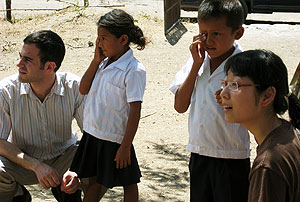The realities of rural and international health care became clear to groups of first- and second-year School of Medicine students on their spring break trips this year. But instead of getting discouraged, these students found a possible career path and future opportunities.
Seven first-year students traveled to a Navajo reservation in Arizona, and 13 second-year students traveled to the Choluteca region in southern Honduras in late March and early April on trips sponsored by the Forum for International Health and Tropical Medicine (FIHTM), a student group that works to expose the medical community firsthand to international health concerns. The trips are funded by the School of Medicine and its alumni.

At the Navajo reservation, the first-year students talked with kindergarteners through high-school students about nutrition, diabetes, substance abuse and college preparation. Working with Youth Empowerment Services, the group also did some service projects at the local school and toured Indian Health Service facilities.
Logan McKenna, a first-year student, said the trip to the Navajo reservation drove home some of the challenges of rural health care.
“There are a lot of areas in the country where it is really hard to get doctors to work,” he said. “But I learned that even if you don’t want to go into international health care, you can do a great service in rural areas of the United States. Before the trip, I never considered rural health care as a career possibility, but after this, I realize it’s an important and valuable thing to do in my life.”
The second-year students spent a week with Central America Relief Effort in rural clinics, shadowing the clinics’ physicians and seeing up to 200 patients a day. In addition, the students went to local schools to give children fluoride treatments, teach proper tooth-brushing skills and perform eye screenings. Several St. Louis-area donors had given them hundreds of toothbrushes and toothpaste to distribute.
While some of the students had traveled internationally before, many were unsure about what they might encounter on the trips.
“Having an intellectual knowledge of the need is different from seeing it with your own eyes and experiencing it,” said Kai Sun, a second-year student. “Although my Spanish isn’t good, I was surprised by how well I could communicate and interact with the people there. I had a connection with the kids, which was very meaningful for me.”
Jacqueline Anderson, a second-year student, said the trip was a good introduction to future short-term trips.
“Even though we had to deal with a lot of frustrations, like lacking certain equipment or supplies, we realized that it would be so easy for us when we are doctors to take the skill set we have and make a huge impact, even if it’s for a few weeks,” Anderson said.
Deepika Rao, a second-year student, said the trip was very positive and motivated her to go into international or rural health.
“We always talk about setting up clinics in a rural community without any idea what it’s really like,” she said. “This trip made it much clearer what problems I will face when I go abroad,” she said.